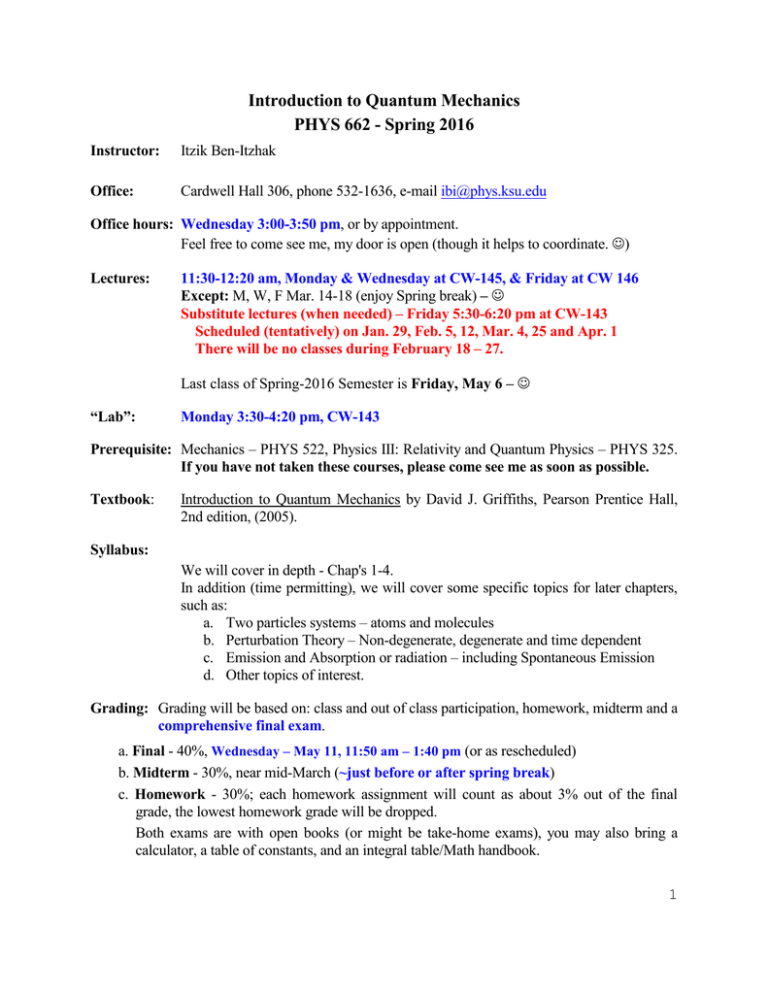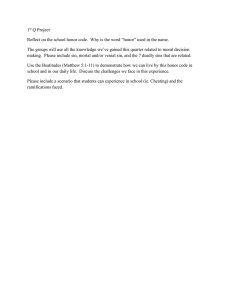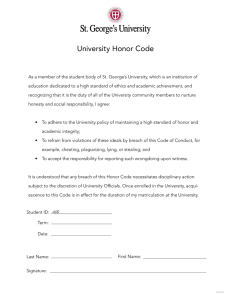
Introduction to Quantum Mechanics
PHYS 662 - Spring 2016
Instructor:
Itzik Ben-Itzhak
Office:
Cardwell Hall 306, phone 532-1636, e-mail ibi@phys.ksu.edu
Office hours: Wednesday 3:00-3:50 pm, or by appointment.
Feel free to come see me, my door is open (though it helps to coordinate. )
Lectures:
11:30-12:20 am, Monday & Wednesday at CW-145, & Friday at CW 146
Except: M, W, F Mar. 14-18 (enjoy Spring break) –
Substitute lectures (when needed) – Friday 5:30-6:20 pm at CW-143
Scheduled (tentatively) on Jan. 29, Feb. 5, 12, Mar. 4, 25 and Apr. 1
There will be no classes during February 18 – 27.
Last class of Spring-2016 Semester is Friday, May 6 –
“Lab”:
Monday 3:30-4:20 pm, CW-143
Prerequisite: Mechanics – PHYS 522, Physics III: Relativity and Quantum Physics – PHYS 325.
If you have not taken these courses, please come see me as soon as possible.
Textbook:
Introduction to Quantum Mechanics by David J. Griffiths, Pearson Prentice Hall,
2nd edition, (2005).
Syllabus:
We will cover in depth - Chap's 1-4.
In addition (time permitting), we will cover some specific topics for later chapters,
such as:
a. Two particles systems – atoms and molecules
b. Perturbation Theory – Non-degenerate, degenerate and time dependent
c. Emission and Absorption or radiation – including Spontaneous Emission
d. Other topics of interest.
Grading: Grading will be based on: class and out of class participation, homework, midterm and a
comprehensive final exam.
a. Final - 40%, Wednesday – May 11, 11:50 am – 1:40 pm (or as rescheduled)
b. Midterm - 30%, near mid-March (~just before or after spring break)
c. Homework - 30%; each homework assignment will count as about 3% out of the final
grade, the lowest homework grade will be dropped.
Both exams are with open books (or might be take-home exams), you may also bring a
calculator, a table of constants, and an integral table/Math handbook.
1
Learning Outcomes:
Have a solid foundation in the basics of theoretical physics.
Have hands-on experience with common mathematical, computational and experimental tools.
Be capable of communicating information, scientific or otherwise, in both written and verbal
form.
Understanding of one advanced topic in theoretical or experimental physics.
Adequate preparation to succeed in graduate studies in physics or other technical disciplines, or
in professional schools.
-----------------------------------------------------------------------------------------------------------------Students with Disabilities
Students with disabilities who need classroom accommodations, access to technology, or
information about emergency building/campus evacuation processes should contact the Student
Access Center and/or their instructor. Services are available to students with a wide range of
disabilities including, but not limited to, physical disabilities, medical conditions, learning
disabilities, attention deficit disorder, depression, and anxiety. If you are a student enrolled in
campus/online courses through the Manhattan or Olathe campuses, contact the Student Access
Center at accesscenter@k-state.edu, 785-532-6441.
Academic Honesty
Kansas State University has an Honor and Integrity System based on personal integrity, which is
presumed to be sufficient assurance that, in academic matters, one's work is performed honestly and
without unauthorized assistance. Undergraduate and graduate students, by registration,
acknowledge the jurisdiction of the Honor and Integrity System. The policies and procedures of the
Honor and Integrity System apply to all full and part-time students enrolled in undergraduate and
graduate courses on-campus, off-campus, and via distance learning. The Honor and Integrity
System website can be reached via the following URL: www.k-state.edu/honor. A component vital
to the Honor and Integrity System is the inclusion of the Honor Pledge which applies to all
assignments, examinations, or other course work undertaken by students. The Honor Pledge is
implied, whether or not it is stated: "On my honor, as a student, I have neither given nor received
unauthorized aid on this academic work." A grade of XF can result from a breach of academic
honesty. The F indicates failure in the course; the X indicates the reason is an Honor Pledge
violation.
Expectations for Classroom Conduct
All student activities in the University, including this course, are governed by the Student Judicial
Conduct Code as outlined in the Student Governing Association By Laws, Article V, Section 3,
number 2. Students who engage in behavior that disrupts the learning environment may be asked to
leave the class.
------------------------------------------------------------------------------------------------------------------
2




